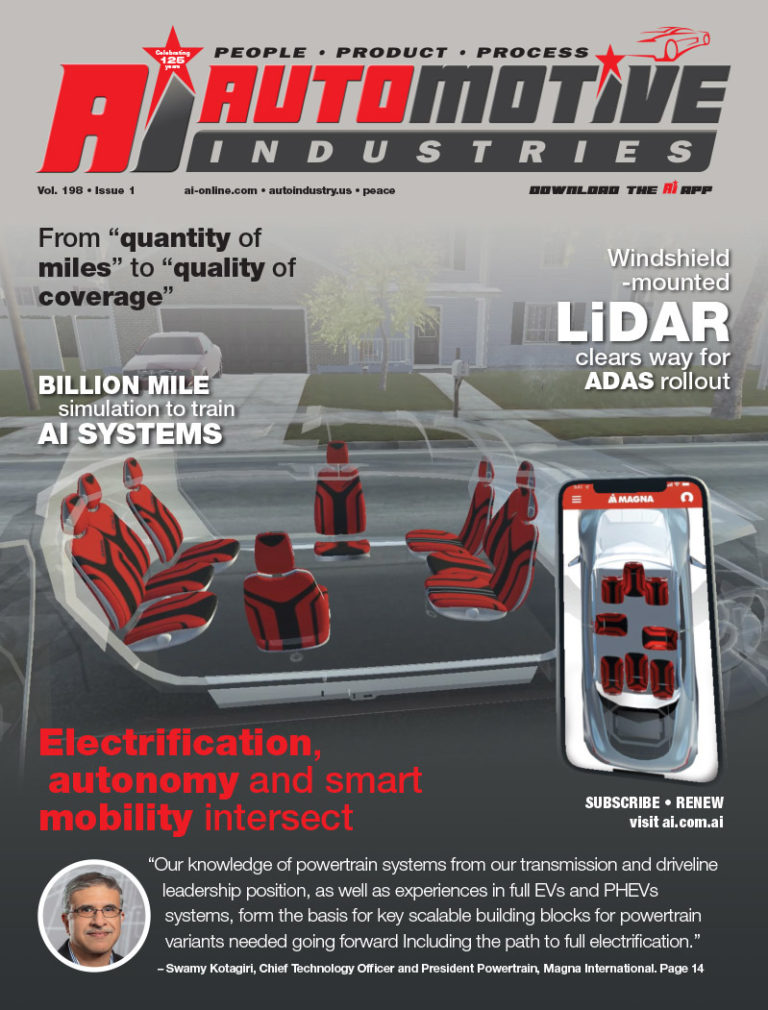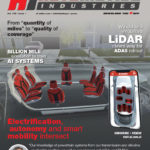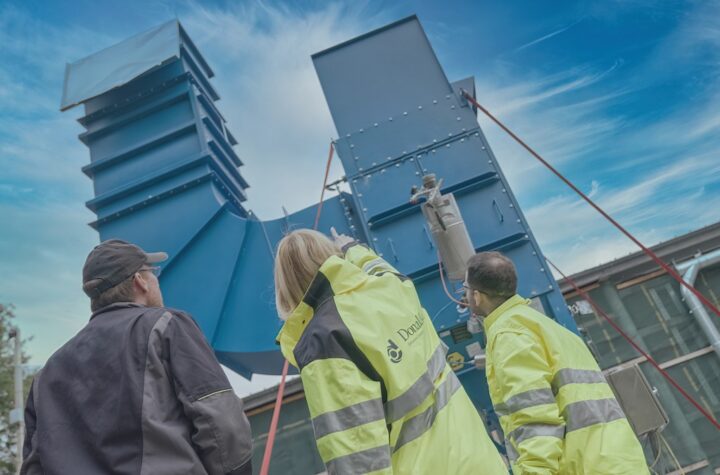
Globally operating DSM Engineering Plastics is experiencing an increased demand for engineering plastics from the automotive industry. The main trends and needs in the automotive industry today can be described as system cost optimizations and productivity gains, improved safety, long term sustainability and reduced environmental impact.
Each of these needs is driven either by legal regulations (CO2 emissions, Euro 4/5/6, pedestrian safety, fuel consumption, biofuels; pedestrian safety; recycling and End-of-Life-of Vehicle), consumer wishes/needs (more infotainment; more safety devices; more comfort and more individualized designs) or by profit considerations within the business chain in the automotive world.
With a strong focus on improved car comfort, safety and fuel economy, engineering plastics play a pivotal role. To underline its commitment to the automotive industry, DSM Engineering Plastics recently highlighted its range of both new materials and specific grades of existing materials specifically aimed at the automotive industry. These materials are designed to deliver the required performance, whilst meeting the overall industry trends for lighter, more effective and greener solutions.
Thanks to this expertise, DSM Engineering Plastics is working with some of the biggest names in the automotive industry, bringing solutions that help to reduce weight, reduce system costs and/or deliver better performance. Amongst these are the use of Akulon PA6 resin for use in oil sumps and oil pans, the use of Arnitel TPC for the production of vacuum brake tubes in the latest Ford Fiesta – and similar applications in Ford Mondeo, Ford S-Max, Ford C-Max, Ford Galaxy and Ford Focus,
and the introduction of a new Arnite Low Outgassing PET XL Grade to specifically meet the needs of Adaptive Forward (AFX) Modules, applied successfully in the production of a new Xenon AFX module for the new Mercedes S- Class and Renault automobile front/rear harnesses benefit from the exceptional dimensional stability, high electrical insulating property and moldability of Arnite®.
Other innovations include Stanyl Diablo OCD2100, a high performance grade of Stanyl for under the bonnet (UTB) applications, outperforming current high heat resins on high temperature stability; Stanyl high performance PA46 for ETC/EGR gear, EGR housing/parts and turbo housing, making it possible to achieve weight reductions of over 50%, and system cost reductions as high as 50%; Akulon® PA6 for oil sumps, combining the functionalities of metal with weight reductions of up to 50%; Akulon Ultraflow PA6 for air bag containers, able to achieve cycle time reductions of up to 25%, leading to a significant reduction in overall system costs; Akulon PA6 for structural reinforcements, combining the functionalities of metal with weight reductions of up to 50%.
In interior and E&E applications, DSM Engineering Plastics offers amongst others Stanyl high performance polyamide for electroconductive LED bases; Xantar® LDS or Stanyl LDS for MIDs; Akulon Ultraflow for AC lamellae; and Arnitel® C for automotive cable class D applications.
DSM Engineering Plastics retains its premier position by emphasizing quality at every step. Apart from quality assurance processes such as the ISO/TS-169494 requirements, all DSM Engineering Plastics locations are ISO 9001:2002 and TS/ISO16949:2002 certified. The company’s test laboratories are certified by external authorities, such as UL for in-house flammability and electrical testing and TS17025.
DSM applies the powerful core tools of the ISO/TS procedures, like the Product Quality Planning and Control Plan (APQP) and the Production Part Approval Process (PPAP). Whether your product is manufactured in Evansville Indiana or Jiangyin China, DSM has global quality standards to assure consistency of products. We remain dedicated to improving processes for our customers and to solving long-term issues with long-term solutions.”
Automotive Industries spoke to Roelof Westerbeek, President DSM Engineering Plastics.
AI: How important is the automotive sector to DSM Engineering Plastics? Where does your company’s expertise in this sector lie?
The Automotive Sector represents a significant part of DSM EP’s turnover. Also other business groups of DSM (like DSM Composite Resins) are highly entranced within Automotive. Our expertise lies mainly in air/fuel, powertrain, auto E&E, airbag and brake systems.
AI: How is the green portfolio for the automotive industry evolving?
As a market leader, we need to ensure that we use energy and raw materials efficiently in order to reduce the environmental impact of our activities. However, at the same time we want to improve the eco-efficiency of our products and processes on an ongoing basis. As OEMs and end-users are looking to reduce their environmental impact, DSM Engineering Plastics develops products that meet the industry’s specific sustainability needs. These include the quests for lower emissions and reduced fuel consumption as well as further weight reduction.
By focusing on eco-efficiency and sustainability, DSM drives its innovation cycle to ensure that key new product innovation and/or development meets the evolving needs of customers, whilst ensuring that products meet key sustainability objectives.
In the Dow Jones Sustainability World Index, DSM is listed as one of the leaders in the chemical industry sector. Within the Performance Materials cluster of DSM, DSM Engineering Plastics is developing an entirely “Green Portfolio” of engineering materials for various automotive applications.
AI: How has the increased greening of auto manufacturers helped your company?
It helped us to gain more focus in our own material and application developments. In addition, we find that the extreme high temperature resistance of many of our materials is now a strong benefit as an additional value proposition to replace metals.
We have an established reputation for delivering eco-efficient automotive solutions, offering CO2/emission/fuel consumption reduction via metal-to-plastic conversion in applications such as air inlet manifolds, air ducts, oil sumps, turbo parts, timing systems and other powertrain components, gears, air bag housings in materials such as Stanyl PA46, Akulon PA6, Arnite PET, and Arnitel TPC.
Weight reduction is targeted by metal-to-plastic or rubber-to-plastic programs or via smart application designs (in high flow & high productivity grades), whereas lifetime extension is sought via new products such as Stanyl Diablo (PA46) and Arnitel C (TPC). DSM EP also supports research in Life Cycle Assessments and Eco- or Carbon Footprints.
AI: Tell us about your company’s product innovation for the automotive sector such as the StanylR Diablo OCD 2100, Akulon UltraFlowR, ArnitelR and newer product releases such as the Fortii R and EcoPaXX.
The trend of downsizing of engines implies the increased use of turbo systems. Stanyl Diablo OCD2100 (PA46) can meet temperature requirements up to 220ËšC and is therefore ideally suited to be used in turbo parts as charged airducts, resonators and others.
High flowability and high productivity materials such as Akulon Ultraflow (PA6) facilitate smarter designs and lower system costs for applications as oil sumps and air inlet manifolds.
An important prerequisite for metal replacement is a need for long term temperature resistance of the plastic at more and more elevated temperatures. DSM EP introduced Stanyl Diablo OCD2100, a PA46 material which exhibits hardly any loss of strength during 5000 hours at temperatures up to 210-230 °C. This material has recently been approved for hot charged airducts. In addition, system costs could be reduced further because of the extremely good weldability of Stanyl Diablo OCD2100.
Another interesting development is the metal-to-plastic replacement for ETC covers and vacuum pump parts and motor housings in DSM EP’s Arnite PET XT, a material which exhibits extremely good dimensional stability and which is able to meet the most tight part tolerances.
Arnitel C (TPC) and EcoPaXX (PA4.10) boost the long term sustainability of plastic parts: Arnitel C can be used as halogen-free flame-retardant solution for wire&cable, whilst EcoPaXX PA4.10 offers a very interesting combination of a great eco-footprint, high melting point and very good chemical resistance in a variety of automotive applications.
Bio based, renewable solutions are currently being investigated and include new bio based building blocks for existing polymers, and new high temperature resistant, bio-engineering plastics based on renewable resources not competing with the foodchain.
AI: Tell us about some of the existing and new automotive applications of your products.
Our products are used today in applications such as air inlet manifolds, air ducts, charge air cooler end caps, UTB covers, chain tensioners, FEAD pulleys, motor management gears, bearing cages, MTD components, air bag housings, brake booster valve housings and CVJ boots. We have also introduced metal-to-plastic conversion for oil sumps (Akulon PA6), turbo parts (Stanyl Diablo PA46) and pump parts (Arnite PET and Stanyl PA46). All these lead to significant weight and thus CO2 emission reductions. In addition, DSM EP has introduced Halogen Free flame retardant coatings in wire & cable applications (Arnitel C).
Our latest material and application developments aim at applications in start/stop and hybrid/electrical vehicles and at applications such as oil sumps














































 WebTech Wireless Receives Order for 3,500 Locators From Cybit Ltd. for European Fleet Telematics Mar
WebTech Wireless Receives Order for 3,500 Locators From Cybit Ltd. for European Fleet Telematics Mar


